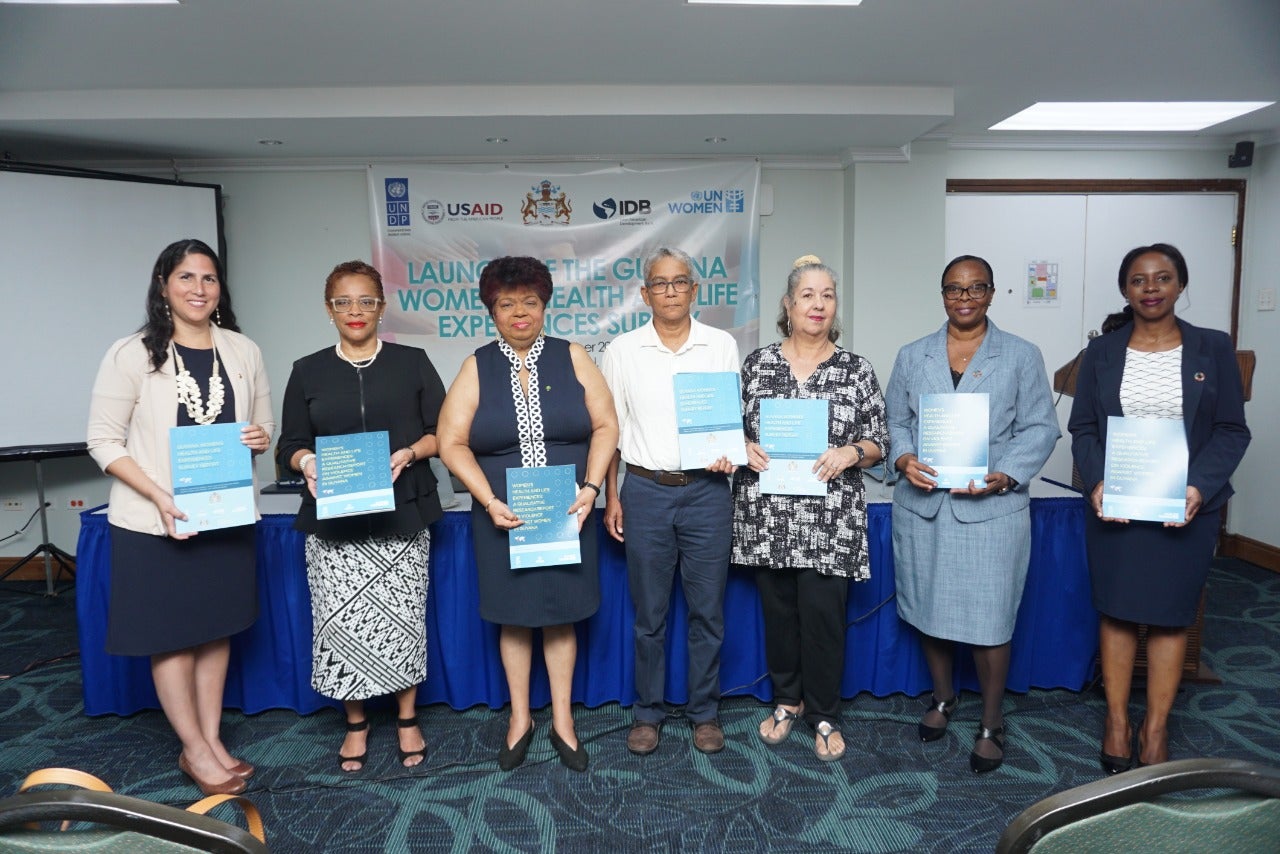1 in every 2 women in Guyana will experience Intimate Partner Violence
Guyana’s First National Survey on Gender-Based Violence LaunchedDate:

Georgetown, Guyana: 1 in every 2 women in Guyana has or will experience Intimate Partner Violence (IPV) in their lifetime. The first comprehensive national survey on gender-based violence in Guyana revealed that more than half (55%) of all women experienced at least one form of violence. More than one in ten have experienced physical and/or sexual violence from a male partner in the past 12 months.
The Guyana Women’s Health and Life Experiences Survey (WHLES) was conducted using the CARICOM model, a measurement adapted from the original WHO (World Health Organization) global model for assessing the prevalence of violence against women in the Caribbean. Importantly, it also captures information on the risk of and consequences of violence for women, their children and families and how and to what extent they seek help.
The scourge of Gender-based Violence (GBV) extends beyond partner-inflicted violence:
- 1 in 5 (or 20 per cent of) women in Guyana has experienced non-partner sexual abuse in their lifetime;
- 13 per cent reported experiencing this abuse before the age of 18.
- Being young is the most significant risk factor for non-partner sexual violence (NPSV), including rape, attempted rape, unwanted sexual touching and sexual harassment.
- The 15–24 age group reported statistically higher rates of NPSV of every type (the 55–64 age group reported the least).
Representative, UN Women Multi-Country-Office Caribbean, Ms. Alison McLean, said:
“UN Women, along with other UN agencies will be using the data gathered from this survey to support national efforts to prevent intimate partner violence through school-based and community-based initiatives; including working with men and boys through Batterer Prevention programs; and private sector initiatives that prevent work-related spill overs of family violence to create safe spaces at work”.
With the support of UN Women, UNDP, USAID and the Inter-American Development Bank, in collaboration with the Global Women’s Institute of George Washington University and the University of Guyana, the study was conducted by the Guyana Bureau of Statistics to better understand the magnitude of and women’s experiences with GBV in all regions of Guyana. [Click here to access the Report]
Global estimates show that 1 in 3 women worldwide experiences either physical and/or sexual violence, mostly by an intimate partner at some point in their lives. In Guyana, 38 per cent of women have experienced physical and/or sexual violence, above the global average.
IPV adversely affects all aspects of women’s lives. Women who began their first union at a young age, lack family support or have a controlling partner have an increased risk of experiencing physical and/or sexual IPV. Women who witnessed violence against their mothers in childhood or have a partner who witnessed such violence are at significantly higher risk, continuing the cycle of exposure and IPV through to their own children.
Half of all women who experienced IPV in Guyana never sought help. Victims, community members and stakeholders attributed this to lack of knowledge of available help, perceptions of being blamed or stigmatized by their situation becoming known throughout the community and inadequate support structures to ensure victim safety after reporting violence to the police.
Recognising the extensive individual, cultural and economic harms associated with violence against women and girls and the benefits that women, girls and all of society would realise if it is addressed, the Cooperative Republic of Guyana has made addressing VAWG an ongoing priority issue. Actions to address VAWG are part of the Republic’s commitments to the Convention on the Elimination of all Forms of Discrimination against Women (CEDAW) and to achieving the Sustainable Development Goals (SDGs).